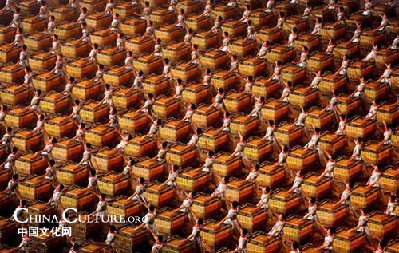The ritual and music culture in ancient China
|
|
The ritual and music culture is the organic constituent of Chinese traditional culture, which has an important influence to continue and further develop Chinese civilization. In the traditional cultural pattern of ritual and music, ritual and music often present the harmonious consistent appearance.
As early as the Xia and Shang Dynasties, wisdoms had already laid down ritual rules and music to promote ethical and moral principles, and to maintain social order, forming a rather complete ritual and music system. And now it still has strong vitality after thousands years of influence in the history of Chinese civilization.
The birth of ritual and music culture
 |
|
|
Music is strongly linked to ritual all over the world and from its first appearance onwards. Music is an essential part of religious rites from the time of primitive worship. Till the Xia Dynasty, the rites system began to form, but it is difficult to know its detail because of a lack of records.
The Zhou Dynasty was the first dynasty to lay down rules of “rites” (sacrificial ceremonies, court protocol, etc.) and “music” (music and dancing which accompanied ceremony). The Zhou Dynasty, which followed the Shang practice of ruling through fiefdoms, made sure that most of the feudal lords were of the ruling clan. So a strict hierarchy grew up among the feudal lords of the Zhou Dynasty, based on the patriarchal clan system and involving clans to which principal wives and concubines belonged. The feudal lords themselves stood in a position of being either major or minor descendants of the Zhou emperor, as did the grandees who ruled the various districts of a feudal state with regard to the ruler of the state, and the nobles under them vis a vis the grandees.
|
|
The system of rites and music reinforced and stabilized this strict patriarchal clan hierarchy. Every person of each grade in the hierarchy enjoyed the type of rites and music assigned to his particular grade. The items of music and dance, the types and number of musical instruments, and the number of musicians for each grade were strictly limited, and to exceed the limits was considered a grave offense.
Tradition has it that these rules were promulgated by the great ruler of the dynasty, the Duke of Zhou. He synthesized ritual rules from remote time to the Shang Dynasty, reconstructing and developing them into a course of action and framework of the State’s laws. Confucius’ view a century later was that music best reflected a nation’s manners, and that in good old times, authority was manifested quite as much in rites and ceremonies as in laws and pronouncements. The system of rites and music endured for the following 2,000 years and more, until it was abolished with the end of the Qing Dynasty, China’s last feudal dynasty.
|
|
The connotation of ritual and music culture
The essence of rite is “difference,” that is to say no matter rich or poor, honorable or humble, young or old, intimate or aloof, people of every group have to follow their regulations of conduct, and should not exceed. Every one’s duty, power and incumbency are confirmed by the classified social status under this order system.
Put emphasis on difference without harmony, the society would go discordant. How to promote great harmony and tolerance in this rating society? Through music. It cast as a ligament, teaching people to a harmonious life. If the monarch and officials listen to music together in the great hall, officials will become more respectful to the lord; if youths and elders of a same clan listen to music together in the town, youths will become more obedient; if father and sons listen to music together at home, they will become more intimate. Thus the Duke of Zhou laid down rules of “music” together with “rites.” Rites for differentiating and music for harmonious synthesis, these two are inseparably interconnected and play a part together.


























